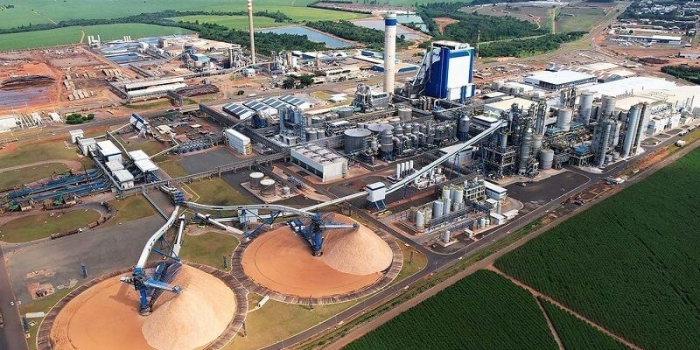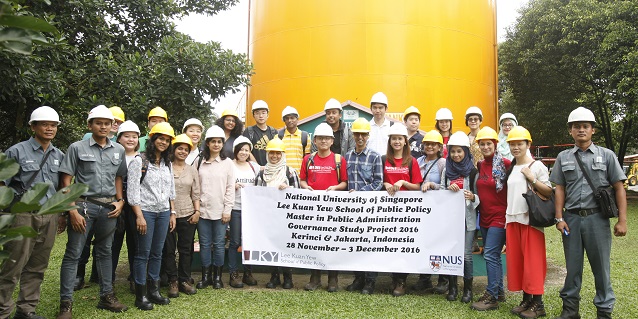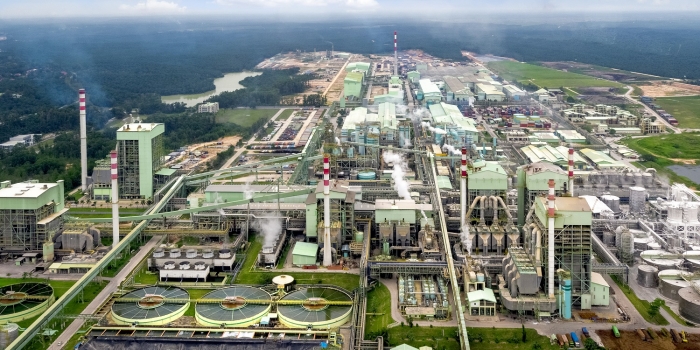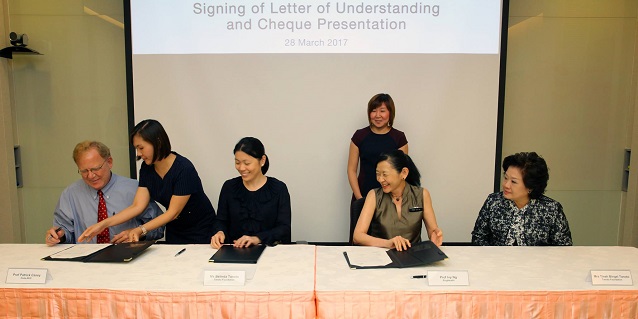This article is an adaptation of “Bracell Invests R$ 20 Billion in Brazil and Plans More” by Stella Fontes, published in Valor Econômico (valor.globo.com). Changes include rewriting some of the passages and adding original materials.
The skyline of Lençóis Paulista, São Paulo, has been transformed with the addition of the towering 144-meter chimney and 102-meter recovery boiler of Project Star, the most modern and “greenest” pulp mill in the world. In September 2021, the facility was inaugurated, cementing the presence of Royal Golden Eagle (RGE), the Asian giant, in Brazil, and securing Bracell‘s position as the world’s largest producer of dissolving pulp. Over the past four years, Bracell has invested over R$15 billion in Brazil.
The majority of the resources were dedicated to the “flex” mill in São Paulo, capable of producing 1.5 million tons of dissolving pulp per year, which is used in the production of viscose. It can also produce up to 3 million tons per year of eucalyptus kraft pulp. The mill was built in an area of 1.6 million square metres and is a landmark of a new generation of mills. It does not use fossil fuels, is self-sufficient in clean energy, and generates a surplus of 150 to 180 megawatts (MW) of power, which is exported to the system and can supply 750,000 homes. Bracell already had a mill in Camaçari (BA), with a capacity of 500,000 tons per year of dissolving and special fibre.
Bracell’s growth ambitions extend beyond fibres. Its purchases of the former Bahia Specialty Celullose (BSC) and Copener Florestal were RGE’s gateway to Brazil 20 years ago. Earlier this year, the company agreed to acquire OL Papéis, marking its debut in the tissue segment. And about ten days ago, Bracell began work on what will be the largest tissue mill in Latin America, also in Lençóis Paulista, with an estimated investment of R$2.5 billion.
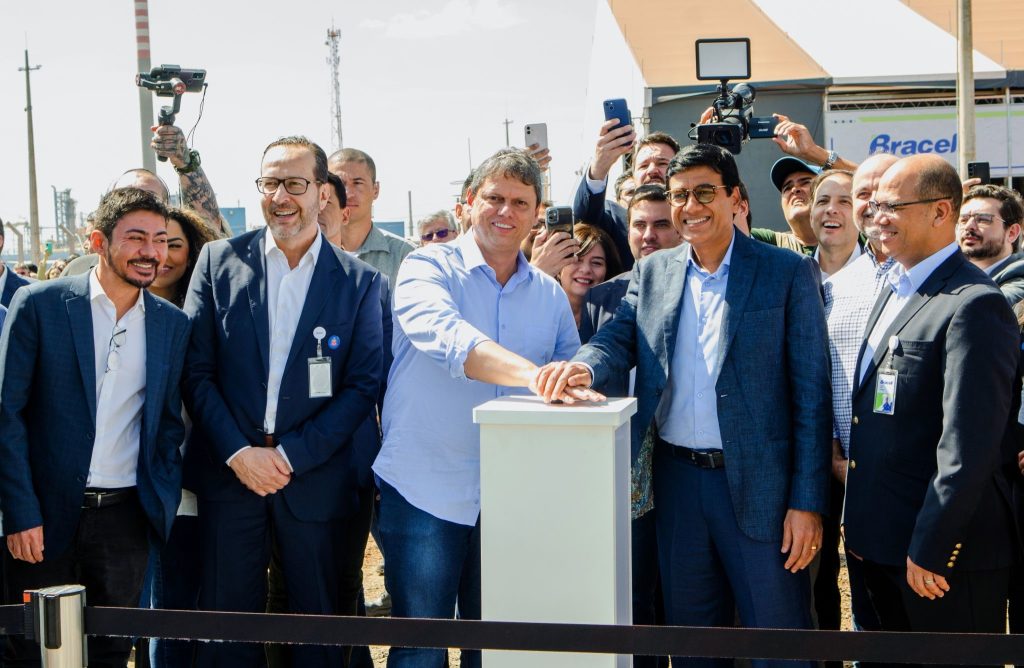
The Governor of São Paulo, Tarcísio de Freitas (centre), with Bracell President Praveen Singhavi (right) during the ground-breaking ceremony for the new tissue paper mill
As part of this round of investments, Bracell announced R$ 2.5 billion for the construction of two chemical mills essential to the production of the fibre. These mills are expected to be operational by 2024, enabling the company to expand into the fertiliser market by providing potassium sulfate (SOP), or to utilise it for its forestry operations. The SOP will be obtained through the treatment of effluents from the mills.
RGE is headquartered in Singapore. Its assets, including Asia Pacific Resources International (APRIL), one of the largest pulp and paper producers in the world, are valued at more than US$ 30 billion and include the production of viscose, palm oil and biofuels, among other activities.
Lençóis Paulista, with its population of just under 70,000 residents, has a history in the pulp industry through its former pulp company, Lwarcel. In 2018, Lwarcel was sold by the Trecenti family to RGE. Lwarcel was small compared to other major producers. Since the arrival of Bracell, Lençóis Paulista has experienced a significant leap in development.
Lençóis Paulista has experienced a significant boost in employment opportunities in the past year, according to recent data from the General Register of Employed and Unemployed People (Caged). The town boasted a positive balance of 2,700 records in its portfolio, with over 2,100 of those records corresponding to hiring by the pulp producer. The unemployment rate in the region reached its lowest point since 2015, with 4,200 out of approximately 6,000 Bracell employees now working at the new unit. In the country, the company generates around 10,000 direct and third-party jobs in industrial, forestry and logistics activities in São Paulo, Bahia and Mato Grosso do Sul.
To accommodate Bracell’s customers, suppliers, employees and shareholders, the small town in the centre-west of São Paulo ended up getting, by the hands of the group, a new and sophisticated hotel, under the Novotel brand.
Since the beginning of operations, lines A and B of the new plant have carried out two dissolving pulp production campaigns and are now dedicated to kraft pulp. While the volume produced for each type of fibre is not revealed, the mix is determined based on market and price conditions, as well as the needs of the group, which uses the dissolving pulp obtained in Lençóis to make viscose in Asia.
RGE has 60,000 employees worldwide
To guarantee the water resources needed for the operation, Bracell built a 22-kilometer pipeline, which transports water collected from the Tietê River. According to the company, it has the lowest specific water consumption for this industry worldwide.
To provide for its operations in São Paulo, it has more than 200,000 hectares of eucalyptus plantations in its own areas, in addition to partnerships in the form of incentives and the purchase of wood from third parties. As of 2021, it expanded forestry operations to Mato Grosso do Sul, with administrative headquarters in Campo Grande and an operational unit in Água Clara.
“Today, between 30% and 35% of the wood we use comes from third parties,” says the company’s Forestry Director, Mauro Quirino. Bracell is investing R$180 million in the region to increase the production capacity of eucalyptus seedlings, with the expansion of the nursery in Lençóis and the construction of a new nursery in Avaí. In total, there will be more than 100 million seedlings per year.
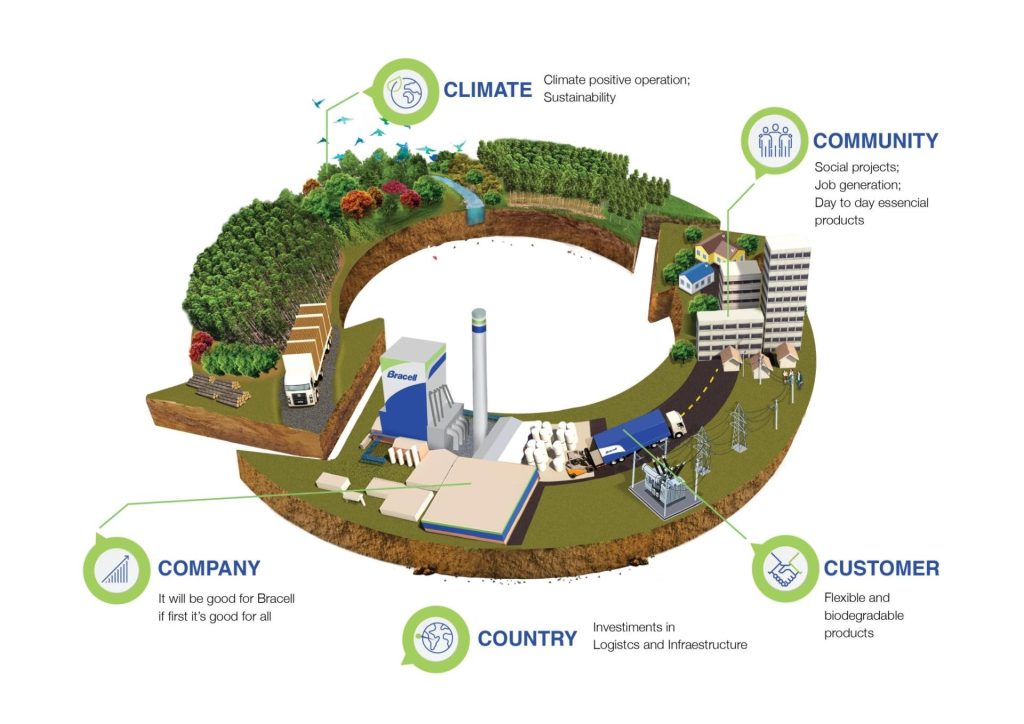
Bracell’s operations are guided by its philosophy that everything it does must be good for the country, the climate, communities and customers, and only then will it be good for the company
Bracell has one of the most ambitious environmental commitments in the industry, the “One-to-One”. By 2025, for each hectare of eucalyptus planted, the company wants to conserve or recover one hectare of native forest. “We commit to eliminating deforestation from our supply-chains,” says the Vice President of Sustainability and Corporate Communication, Márcio Nappo.
Bracell commissions 100% electric truck for pulp transport
The pulp producer based in Lençóis, transports its pulp by road to the Intermodal Terminal in Pederneiras, São Paulo. The terminal, built in partnership with MRS Logística, is located 35 kilometers away from the plant and is covered by a fleet of 130 trucks. To reduce emissions during this stage of the transportation process, Bracell is currently testing the use of a 100% electric truck in partnership with Chinese company XCMG. The truck has a capacity of 40 tons, making it the first of its kind. The trial is part of Bracell’s efforts to promote sustainable practices and reduce its carbon footprint.

Bracell uses an electric truck to transport pulp on the stretch between the plant, located in Lençóis Paulista and the Intermodal Terminal in Pederneiras
At the same time, the company began studies for the potential construction of a railway branch connecting the mill to the Pederneiras terminal. Both Malha Paulista and Malha Oeste, which will be re-bid, are considered options in this case. “We’ve already done the basic engineering and are finalising the Environmental Impact Study and Report (EIA-Rima),” says Bracell’s logistics director, Alberto Pagano.
From the terminal in Pederneiras, the pulp goes by rail to the Port of Santos, in a three-day journey. The locomotives are from MRS and Bracell invested in 530 of its own wagons. At the port, the pulp producer is investing R$300 million, without considering the grant, in the Bracell Port Terminal (formerly STS 14A), already with a capacity of 3 million tons per year. The works started in 2021 and should be completed in November.



